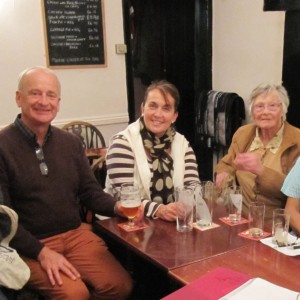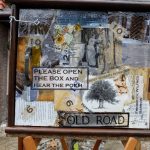Members of WCT continue to follow up research about families living in Wimborne during the First World War.
Recently, we met Len Pearce, who talked about his research for the Memorial book held at Wimborne Minster, which gives biographical details about the men from Wimborne and surrounding villages, who died in the First World War. As a boy, he remembers meeting the widows of some of the men who died, and his Grandfather was the Town Crier during that time.

We also held a meeting in the Green Man pub on the corner of Old Road for residents of that road, and those attending were intrigued to hear about the significance of several families living there whose sons were killed.
The Reverend Fletcher, writing in the Wimborne Minster Parish Magazine in September 1917, put it like this:
‘There are few districts in the kingdom which have supplied so large a number of volunteers as the Old Road, in Wimborne, has done; and Sergt. Rossiter is the seventh inhabitant, from a road which contains only 24 cottages, who has given his life for his King and country. ‘
Apart from the Rossiters, the other families who lost sons were:
Harvey, Gollop, Barrow, and Loaders
A poem entitled, “Patriotism At Wimborne – A True Story’ was written about the Loader’s story, and copies sold at one penny to contribute to St John’s Nursing Fund. The poem is held in the archive at Priest’s House Museum.
Patriotism at Wimborne – A True Story
This narrative poem by SP, 23 Leigh Road, Wimborne was recited by
Dorothy Cotton at St John’s Parish Hall during the First World War
(Priest’s House Museum Archive)Now I’ll tell you a story, nothing new, did you say?
Yes, it’s quite a new story, it’s as true as the day,
Of course, since the war, you get stories galore,
But I’ll vouch for the truth of this one, it’s no bore.
Here, in Wimborne, a lot of our boys have gone out –
Out in France with the allies, the Germans to rout.
And we take off our hats when a soldier we meet,
Whether out in the fields, sir, or down in the street –
Yes, we’ve just got to value the khaki-clad boy,
But I fear ‘fore the war, sir, we thought him a toy.
Now they’re fighting and bleeding old England to save,
Their lives they laid down for you and for me,
Because they loved England, the land of the Free;
And drank to the day – with their evil mind glee.
But the story I’d tell comes from the road named Old,
Just listen awhile and I’ll tell you their names;
There was Teddy, the eldest, and William as well,
And Charlie and Bertram, two others as well,
And the names of the two, sir, were Harold and Owen.
The eldest one Teddy, in the navy enlisted,
The William on joining the army insisted,
Then Charlie and Bertram, and Harold and Owen,
Donned the khaki – who’ll say, sir, there any bills owing
From a family that’s sent out six sons to the front
To fight for old England, and help bear the brunt
Of the struggle for right and the weak to defend?
On the end, we are sure, for on God we depend.
Twelve years in the navy boy Teddy put in,
And William twelve months in the trenches has been;
And Charlie, poor Charlie’s been down with the fever,
And the mother is sad ‘cause the boys had to leave her –
But Charlie recovered from fever, and then
Went back to the trenches in winter, and when
The frost came so keen, while he watched with the rest,
He got frost-bitten, sent back to the base for a rest;
Again he recovered, again he went out,
But again the poor fellow was turned right about –
The Germans came out with their murderous gas
And a cloud came along the way he would pass.
And again he was saved, on a furlough was sent,
And he gladdened the home while on health-seeking bent;
But again God was good, and his health was restored,
Again packed his kit, and way to France soared,
Away to the trenches he once more returned,
A thought to neglect his old pals, he’d have spurned,
But this time poor Charlie was food for the sniper,
They thought he’d have gone to the grave with the piper –
A cruel German bullet went right through his chest
As one morn his vocation he followed with zest.
Now this family is well known to lots in the town,
And surely such service will give them renown,
A level half-dozen they’ve sent for the King,
And surely their praises we ought to often sing,
And when all the laddies in khaki come home
To the cliffs where we oft see the waters in foam,
Now just don’t forget ‘twas for you they went out
To try the mad Kaiser’s great army to rout;
And a last word I’ll give you before I sit down,
Don’t always look sad – don’t sit with a frown,
But pray to the Father our laddies so brave;
And if you can’t fight – just get down on your knees
And petition the Father, faithful prayer will Him please.
The Town Crier’s bell – the 11ins (30cm) high military-issue handbell, which has an iron clapper, dates from World War I when it was used for gas attack warnings.
Another very useful meeting was with the current Wimborne Town Crier, Chris Brown, to hear about his research into local families, particularly the Angell and Wareham families.
Many of these stories, particularly that of the Angell family, found their way into the final production and the Old Road story was the inspiration for a sound installation Anthem for Old Road by Adrian Newton in the run-up to the production. Read more
If you have any information about these families, please contact us.

